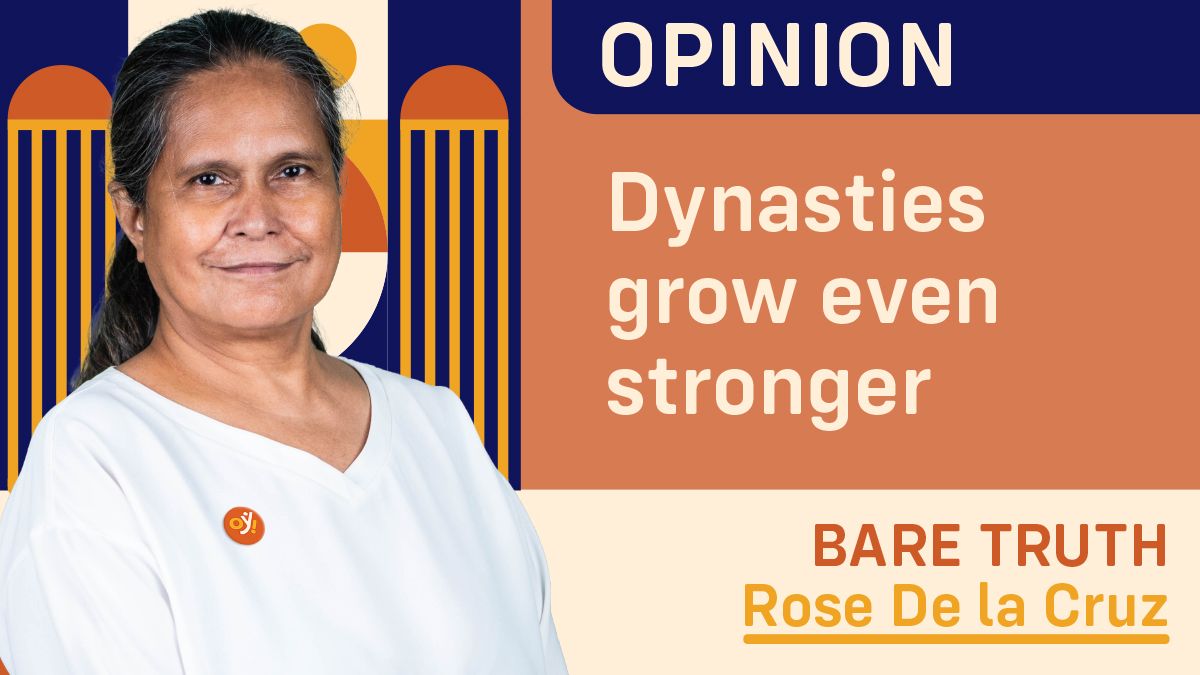Political dynasties are growing even stronger under this dispensation, with the administration slate having surnames of families already positioned in the legislature, while in the local governments retirees from the legislature and their kins are vying for top positions in the provinces, cities and municipalities.
Either the political entrants are new in the business of politics (yes they all consider positions in government not as a civil service, but more as money and the wealth and untold influence they bring to their families) or were part of public positions moving horizontally or vertically.
The voters– majority of them in the lower classes of society (unlettered or consumers of political patronage)-- often cast their votes for the rich, the influential or those who have been useful or have helped their families in whatever way– past or present and even an assurance of such aid in the future. Many are being hauled to the polling precincts with food and ‘stipends’ ranging from P100 to P500 just casting their vote for the candidate that gave them such “importance.”
No wonder that deserving but unknown candidates ( those that have genuine public service in their hearts) never get elected because they don't have the logistics and the machinery to push for them. These kinds of candidates depend on the generosity of “sponsors” to shoulder their campaign paraphernalia and other wherewithals.
A recent story of Business World said that “rich Filipinos seeking to enter politics and politicians whose terms have ended are likely to run for office through the party-list system, which could dilute sectoral representation at the House of Representatives, said political analysts it interviewed.
About 80 percent of the more than 300 congressmen are district representatives, while the rest of the seats are allotted to party-lists, supposedly to help sectors push their legislative agendas.
“In the 2025 midterm elections, we are expecting more party-list groups who will have their nominees from powerful dynasties and nominees who are popular and rich,” Political Science professor Arjan P. Aguirre of the Ateneo de Manila University, told the paper.
“This tells us that party-list groups who do not belong to the wealthy, popular and powerful groups are having a hard time winning the system,” he added.
Congressmen have three-year terms and may be re-elected for a total of three consecutive terms.
The 1987 Constitution created the party-list system, but it was not until eight years later that an enabling law came to force.
“Since 2013, the average growth of the number of participating party-list groups is 21.3 percent. The biggest jump was in 2022, when we saw a 32 percent increase in participating parties with 43 seats to 177 from 134,” Aguirre said.
He added that some party-list nominees had been “linked to a dominant dynasty in a locality, wealthy industry, or entertainment or popularity-oriented venture.”
Party-list groups are now also campaigning through “popular nominees,” he added. “This is one of the effects of the Supreme Court decision to open the space of the party-list system to mainstream parties and groups alongside sectoral groups of the marginal sectors in society.”
The tribunal in 2013 ruled political parties could also participate in the party-list system, allowing “ideology-based and cause-oriented parties” to run for a seat in the House.
The landmark ruling “is a step in the right direction,” said Edmund Tayao, president of Political Economic Elemental Researchers and Strategists.
“The problem is we don’t have a working appreciation of what a real political party is.”
“We don’t have ‘real’ political parties so we have a flawed idea of what it is, thus preventing a much-needed appreciation of their significance,” he added.
He said campaign rules for party-lists are “deficient” because these focus on their nominees instead of the groups themselves.
“The whole setup is problematic, The presence and dominance and further strengthening of dynasties is due largely to the prevailing political system,which is… an archaic political setup. It will never have room for genuine marginalized groups,” he added.
The Commission on Elections (Comelec) should revise the Election Code by incorporating “fundamental changes” in what defines a political party, he said.
Last Sunday, militant group Bayan Muna condemned what it called the exploitation by the political elites of the congressional party-list system, urging the House to take up a bill preventing the “infiltration of political and economic elites” in party-list groups.
Filed in 2022 by Party-list Reps. France L. Castro, Arlene D. Brosas and Raoul Danniel A. Manuel, House Bill No. 211 seeks to restore the “original purpose” of the party-list system by ensuring that registered groups truly represent marginalized groups through a public hearing by the Comelec.
The bill disqualifies former officials from President down to town mayors, as well as ex-Cabinet members. “Senators and congressmen must also be disqualified,” Neri J. Colmenares, one of Bayan Muna’s nominees in the midterm elections next year, stated.
“You already won in the senatorial or congressional elections because of your wealth, and now you still want to join the party-list?” he asked. “We owe it to the Filipino people to protect the spaces intended for their genuine representation,” he added.
So where is genuine sectoral representation if the rich, powerful and influential families corner elective and appointive positions in government?
#WeTakeAStand #OpinYon #OpinYonColumn #ColumnbyRosedelaCruz #BareTruth #Election2025 #Dynasties #COMELEC
